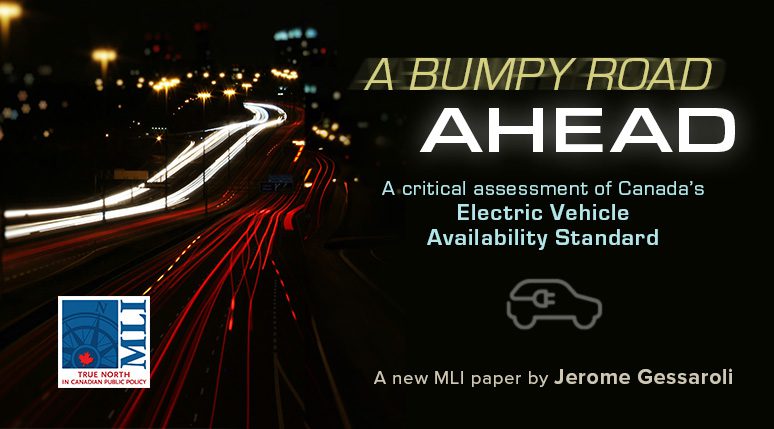By Jerome Gessaroli
May 9, 2024
Executive Summary
This paper examines Canada’s plan to mandate that by 2035 100 percent of new vehicles sold will be zero-emission vehicles under the federal government’s Electric Vehicle Availability Standard. While electric vehicles (EVs) offer advantages over internal combustion engine (ICE) vehicles, concerns persist over cost, driving range, charging options, and carbon emissions during battery cell manufacturing, making mandated goals uncertain.
Geopolitical and economic implications arise from EV mandates in the US and Canada, particularly as they relate to the dominance of Chinese EV manufacturers. There are security risks associated with Chinese control of critical minerals essential for EV production, economic threats to the North American auto sector, and hurdles faced by local automakers in competing with their Chinese counterparts.
The paper notes aluminum’s increased use in EVs to lower overall weight and increase efficiency and driving range. However, aluminum production is carbon-intensive, and increased usage raises an EV’s GHG emissions life cycle. A recent study forecasts a substantial increase in aluminum usage in new EV construction, significantly adding to an EV’s carbon footprint.
In the event of a critical mineral shortage, prioritizing small battery packs for compact and midsize EVs could maximize GHG emissions reductions. However, automakers profit more from SUVs, and consumer preferences lean heavily towards SUVs. Thus, if automakers prioritize fewer of the larger battery packs that large electric SUVs use over many smaller battery packs, the expected reduction in GHG emissions may not materialize as forecasted.
Norway has the most EVs per capita. Its approach to reducing GHG emissions through EV subsidies has been very expensive. It offered extensive tax (and non-tax) incentives for EV purchases; its EV tax incentives alone cost over $1,800 per tonne of GHGs mitigated. This contrasts starkly with Canada’s estimate of $266 of social costs incurred from generating one tonne of GHG.
The paper also discusses potential disruptions in the market due to the prescriptive nature of the Electric Vehicle Availability Standard, which mandates that EVs comprise a specific minimum proportion of sales. If there is a misalignment among government, consumers, and auto dealers with these targets it could lead to elevated prices, vehicle shortages, and unmet consumer demands.
Additionally, the paper addresses the impact of non-exhaust particulate matter (PM) emissions from EVs, which may surpass those of ICE vehicles. These emissions, which contain heavy metals, microplastics, and micro rubber, create substantial risks for adverse health effects and premature fatalities.
Since EVs are relatively new in Canada, there is limited data on collision-related insurance claims, leading to uncertainty about future EV insurance costs. In contrast, the UK, where EVs are more established, saw dramatic increases in insurance rates in 2023 for EVs compared to conventional vehicles. Statistics also show that EV repair costs are higher than for ICE vehicles, prompting concerns from industry figures like Elon Musk about the need to lower those costs.
Further, maintenance and general repairs for EVs differ from those for conventional vehicles. While electric drivetrains have fewer moving parts, potentially simplifying maintenance and repairs, EVs use sophisticated technologies that may raise repair costs. A large survey revealed that EVs encounter more problems than gas-powered vehicles, particularly with their electric motors, batteries, and charging systems, highlighting their complexities.
EVs offer lower refuelling or charging costs compared to gas-powered vehicles. According to the federal government, driving a midsize car for 400 kilometres costs approximately $10 in electricity compared to $50 in gas. However, this comparison may not be entirely fair due to the significant government taxes included in gas prices that are absent from electricity prices. Assuming comparable taxes on electricity as on gas, the cost of the above recharging example could rise significantly from $10 to $25.62, still cheaper than gas, but less so than without the taxes.
As of 2023, Canada had 26,500 public charging ports. Projections indicate that the country will need about 455,500 public ports by 2035. This requires adding about 98 new ports every day over 12 years. These estimates do not include private charging ports.
Electrical utilities in Canada will face significant hurdles in ensuring distribution grids can handle the substantial demand for EV charging capacity. Upgrading and expanding various grid components will be necessary, but the compressed timeframe imposed by the regulations raises uncertainty about timely completion.
Overall, the government’s ambitious timeframe is unrealistic, risky, and potentially ineffective in achieving significant emissions reductions. Concerns also arise regarding threats to Canada’s auto sector, its nascent EV supply chain, and the substantial investments needed for charging infrastructure and grid enhancements. Additionally, potentially higher EV ownership costs would disproportionately affect lower- and middleincome individuals, with accelerated adoption timelines exacerbating these issues.
Canada needs a more flexible approach to light-duty vehicle emissions reductions. This includes rescinding the current mandated zero-emission vehicle sales minimums and replacing them with increasingly stringent GHG emission standards. Such a change would enable automakers to adjust their vehicle portfolios to market needs while still meeting emission reduction goals. Additionally, Canada’s targeted standards and timelines should align more closely with industry efforts to source critical minerals and develop less costly, yet profitable EVs with superior operating characteristics.
Read the full paper here:







